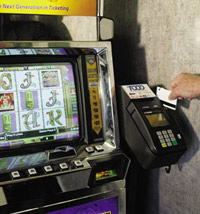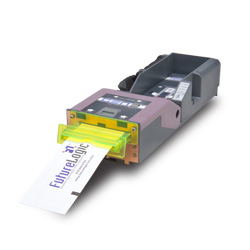Article
Ticket systems decrease the flow of cash in casinos
The clink-clink-clink of coins going into a slot machine might become a thing of the past, as ticketing systems aim to create cashless gaming. But will traditionalists miss the sights and sounds of the old tactile experience?
October 9, 2005 by James Bickers — Editor, Networld Alliance
There are a small handful of images in the collective subconscious tied to the city of Las Vegas: a neon cowboy, dice being tossed down a craps table, a slot machine furiously spitting coins while players dance with joy.
That last image is on the verge of extinction, thanks to ticketing systems that aim to take the coins out of the equation. Companies like FutureLogic and Global Cash Access are winning converts to their cashless gaming devices, and it appears that the reviews have been almost unanimously positive.
"I can always remember my grandmother playing slots in Atlantic City," said G. Douglas Dreisbach, managing editor of Southern Gaming magazine. "When we'd see her after a few hours of playing slots, her hands would be black from handling the dirty coins. Now you don't have any of that."
Quick success
The move to ticket-based gaming has happened quickly. Diran Kludjian, executive vice president of North American and international sales for Global Cash Access, said approximately half of all the slot machines in the United States are ticket-enabled - and that's after just a few years of implementation.
Systems vary, but common components include a printer that dispenses a barcoded slip when someone "cashes out." That ticket can be taken to a kiosk and exchanged for cash, or it can be inserted into another game machine. What has been removed from the process is the need to fill a bucket with coins and take that bucket to a cashier cage, where the coins are counted and exchanged for cash.
 |
  |
 |
"A lot of slot players are skewing older, and frankly maybe those people are getting to where they don't want to have to carry a big bucket of coins to the cashier," Dreisbach said.
Increasingly, a card-reader component is used for the initial "buy-in." Players can swipe a card at the slot machine or a kiosk nearby, purchasing credits directly or a slip that can be fed into a game.
"Patrons are voting with their wallets to use plastic," Kludjian said. "Electronic funding is more efficient, safer and more convenient for patrons. For casinos, electronic funding plays into their efficiencies of handling less cash."
John Robison, author of "The Slot Expert's Guide to Playing Slots" and host of a slot-related radio program, said that players were skeptical at first, but quickly came around.
 |
| Global Cash Access's TODD (Ticket-Out Debit Device) enables players to use their debit cards at a slot machine, and dispenses tickets for winnings. |
"Players had every attitude you can imagine," he said. "Some were reluctant to use the systems, not because they were suspicious, but because they felt that hearing the coins drop into the tray and handling handfuls of coins was part of the fun of playing the slots. Others were grateful that they no longer had to wait for machines to dispense a large number of coins, or wait for hopper fills, or dig around in coin trays that have been used as ash trays."
"From the standpoint of the casino, it's a win-win - you don't have to refill the machines, you don't have to have someone come around to cash out a winner, all those positive things," Dreisbach said. "The only negative would be if the machine breaks down or runs out of paper, but the basic slot technician can fix that in a matter of minutes."
Maintaining the experience
|
So, what about the tactile feeling of dropping a coin into a slot, then pulling the handle?
Of course, even the handle is long gone, replaced with a button. As long as the gaming experience remains smooth, convenient and easy, gamers are not terribly resistant to change. They do, however, want the world to know when they're winning.
"A lot of people said, `If I hit a jackpot, I want to feel the excitement of hitting it. And if I don't hear and see the coins pouring out at me, I don't get that excitement,'" said Dreisbach.
He said a similar void was felt at the Atlantic City Borgata Casino, which opened in summer 2003, featuring mostly cashless systems. Testers who visited the facility in a pre-opening walk-through complained of an "eerie sound," that the place was just too quiet.
 |
| FutureLogic's GEN2 cashless gaming printer |
The answer? Digitized sounds of clinking coins play through the game speakers.
"For me, there was little value added to the slot-playing experience by handling coins," Robison said. "It was fun for a minute or so to hear the coins hitting the tray, but after a while it became annoying. And waiting for a large cash-out was a waste of time. Let's not forget the time it took for the coin-counting machines to count the coins."
He does acknowledge that there is a psychological factor at work, too, that will certainly affect the way people play.
"Tickets add a degree of separation between players and their money in much the same way that chips do," he said. "Losing a black chip doesn't seem as bad as losing a $100 bill. Some players may be more likely to put a $100 ticket into another machine, but cash in a bucket filled with $100 worth of quarters."











